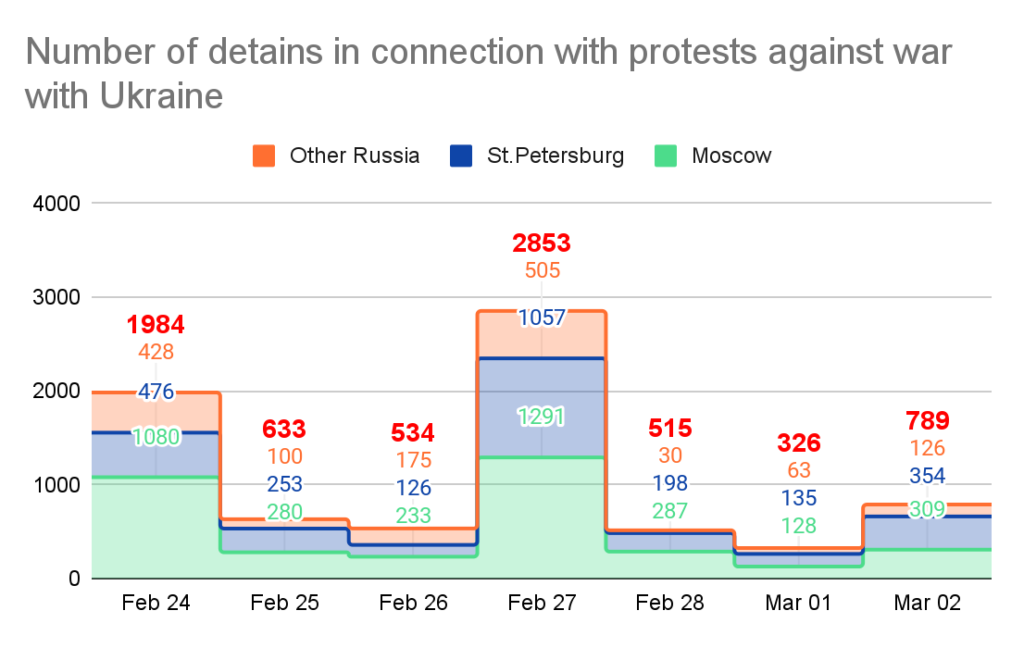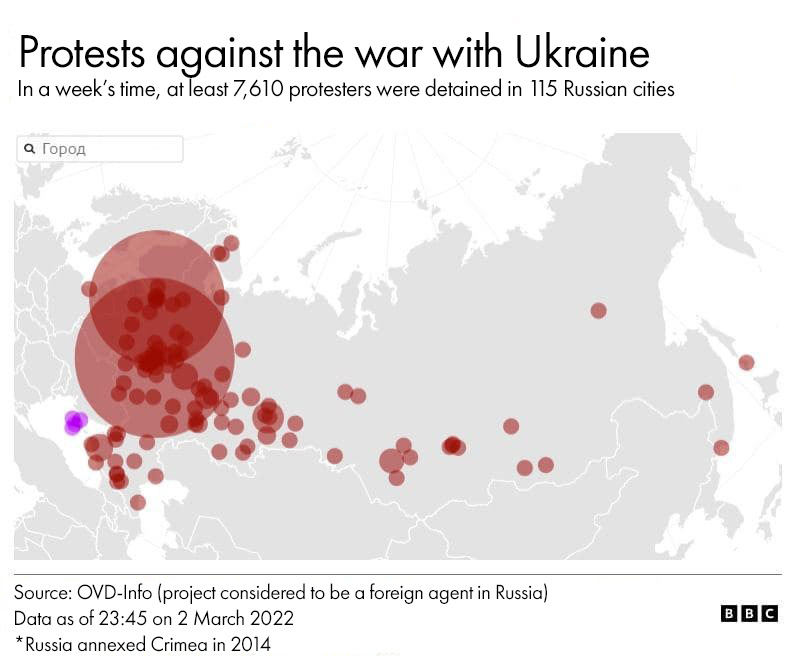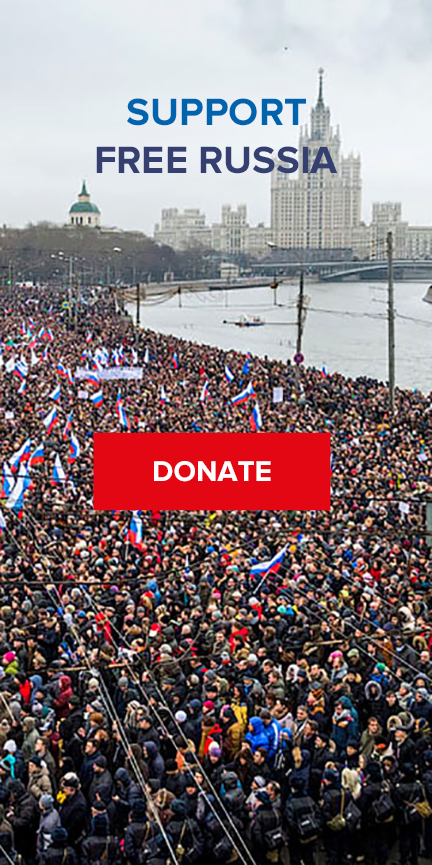Despite Draconian Government Measures, Russian Civil Society Rises in Anti-War
Protests
On the ill-fated date of February 24, 2022 Russians began to protest Putin’s invasion of Ukraine. Some protests got off to an early start amid news of the alleged invasion of Ukraine by Russian troops. However, when the reports were confirmed, civil society exploded.
Online petitions and open letters began to appear, appealing to Putin and the world to stop the fighting in Ukraine.
People take to the streets
At the time of writing on March 3rd, a total of 7,634 people have been detained at protests in 115 cities since February 24th. Of the total, 3,608 protesters were detained in Moscow, and 2,599 were detained in St. Petersburg.
Statistics of the human rights project “OVD-Info“ (updated in real time).

Number of detainees at protests against the war with Ukraine

Due to the intensification of the protests, the Prosecutor General’s Office of the Russian Federation began to issue warnings. Under Article 275 of the Criminal Code “Treason,” Russians now face up to 20 years in prison for providing virtually any assistance to Ukrainians. I would like to provide some specifics, however, as often happens in the Russian Federation, the department’s wording is rather vague. “State treason” can now apply to people who provide advisory assistance (whatever that means), as well as financial, material, technical and “other” assistance. Using the phrase “other assistance,” the Prosecutor’s Office can include anything that it wants.
On march 3, 2022, the Prosecutor General’s Office made an official announcement promising to initiate criminal charges against those who take part in protests— under Part 2 Article 282.2 of the Criminal Code of the Russian Federation (participation in the activities of an extremist organization).
“Amid an unprecedented information attack on the Russian Federation, appeals to citizens to hold supposedly peaceful “anti-war” actions are spreading on the Internet.
It must be noted that the source of many such appeals are associations that, due to their extremist activities, have been banned in the territory of the Russian Federation by a court decision,” the agency writes.
Russians face from 2 to 6 years in prison under this article of the Criminal Code.
Over the course of the past week, the police visited the homes of activists and participants in anti-war actions on a daily basis. All have been charged with participation in an unauthorized mass event (Part 5 Article 202.2 of the Administrative Code of the Russian Federation, carrying fines of 10-30 thousand rubles, or arrest for up to 15 days). Some people are charged under part 8 of the article, with “repeated violation of the rules for holding mass events,” for which the punishment is a fine of up to 300 thousand rubles or imprisonment of up to 30 days.
During the rallies, the police are also detaining journalists. This happens despite the fact that the journalists observe the law (by wearing a special vest, and carrying a statement of their assignment, a press card and a media badge). On March 2nd, the police detained two Sota correspondents for more than 7 hours, attempting to charge them with organizing an unauthorized event (part 1 of Article 20.2 of the Code of Administrative Violations).
The police also detained journalists from Novaya Gazeta, Radio Liberty, 93.ru, TASS, Pskov Gubernia and many others.
The police regularly use violence during arrests. Children, the elderly, and mothers with infants are detained.
Initially, the anti-war rallies were spontaneous, but on March 2nd, the politician Alexei Navalny, who is in prison, called upon all Russians to attend daily rallies against the war with Ukraine.
“Don’t wait another day, no matter where you are – in Russia, in Belarus or on the other side of the planet. Come out to the main square of your city every weekday at 7 p.m. and at 2 p.m. on weekends and holidays.”
Even before the military conflict began, a number of Russian oppositionists, including Alexei Minyaylo and Dmitry Tsorionov (Enteo), had applied to the Moscow City Hall to hold an anti-war rally of 150,000 people on March 5th in Moscow.
The “Vesna” movement from St. Petersburg had also announced that they would hold an all-Russian anti-war rally on March 6th across the country.
“The all-Russian protest rally will take place on March 6th. We will meet at 15.00 in the central squares of all Russian cities to express our protest. We have every right to do so according to the Constitution.”
Green ribbons began to appear on the streets of Russian cities, as a symbol of the protest promoted by Vesna.
From Olympian to deputy
Among those who disagree with the need to send troops to kill are members of a variety of professions.
The organization “We are not alone“ has compiled a list of open letters against the war from members of various professions. The site is updated every day as new letters appear.
Here are a number of examples of open letters:
— IT workers: 32,050 signatures;
— Correspondents of Russian media. This letter was penned by “Kommersant” journalist Elena Chernenko, for which she was removed from the Ministry of Foreign Afffairs press pool.
— Doctors: 11,650 signatures;
— Students and university staff: 14, 850 signatures.
In total, “We Are Not Alone” has recorded 62 open letters and more than 160,700 signatures from members of professional communities.
In addition to letters from professional associations and unions, political activists have created several petitions, both for Russians and for the international community. The largest of these is the petition “Stop the War on Ukraine!“ created by Russia’s oldest human rights activist, Lev Ponomarev. As of this writing, 1,166,617 people have signed the petition.
On February 24th, Ponomarev was detained, allegedly for organizing an anti-war protest. He received a fine of 30,000 rubles.
On March 3rd, he went to the prosecutor’s office to have a report drawn up for having failed to note “foreign agent” at the bottom of the petition. He was attacked by journalists of the pro-governmental NTV channel.
The international civil society organization “Avaaz” launched the international petition “Stop This War.” At the time of writing, 2,272,973 people have signed the petition.
Civil society activist Dmitry Ratner launched the petition “Impeach Russian President Vladimir Vladimirovich Putin“. At the time of writing, 273,560 people have signed the petition.
Prior to the start of hostilities, the “Yabloko” party launched the petition “NO WAR“. It is also possible to leave a signature in the offices of the party. On March 2nd, the Nizhny Novgorod office was attacked and the premises were vandalized.
Conclusion
Hundreds of thousands of Russians are speaking out against the war. Thousands of Russians are detained every day at anti-war rallies. Government agencies are threatening the media and ordinary citizens with decades in prison.
Unfortunately, hundreds of thousands of other Russians have been misinformed through years of brainwashing by pro-government propaganda. The independent media outlets that could fight the propaganda are either blocked, or forced to stop broadcasting, or to leave Russia altogether. The journalists of independent media outlets that have not yet been blocked are being detained.
Despite the censorship and the threat of criminal charges, Russian citizens are taking to the streets, reporting about the reality of the war on social media and are trying to convince the public that this is no “special operation of liberation,” but the very real war that it is.

